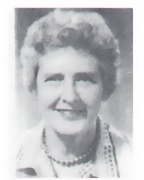Montgomery County Women's History Archive:
40 Women of Historical Significance in Montgomery County

Elizabeth L. Scull
(1924-1981)
Outspoken advocate for housing for the poor
Elizabeth Lee Scull was born in 1924 into one of the most prominent families of Montgomery County. Descended from the Blairs of Maryland and the Lees of Virginia, she spent much of her childhood in the house of her grandfather after her parents’ separation when she was 11 years old. Scull attended St. Timothy’s School in Catonsville and Vassar College.
She married David Scull, a county businessman. David Scull was elected to the County Council in 1966. Elizabeth Scull served as Chair of the county Human Relations Commission, and became an active member of the county’s first Housing Authority. The Sculls worked together closely in politics and civic causes. When in 1968, her husband died from a sudden heart attack, Scull was determined to take his seat on the Council. Since his party chose to support another candidate, Elizabeth Scull switched parties in order to run.
Scull won stunning election victories on three successive terms, in 1970, 1974 and 1978. In 1970, she won her first election to the Council by the largest margin of any candidate. In 1974 and 1978, she was the highest vote-getter. In 1978, she polled a county wide total of 88,000 votes, which was 57,000 votes more than her older brother, then acting Governor Blair Lee III, received in his home county during his failed bid for the Democratic gubernatorial nomination. Independent in her thoughts and actions, Scull was able to earn the support of all political parties.
Never following party lines too closely, Scull focused on serving the public. "I am interested in good government," Scull told a local newspaper in 1981. "I am interested in making government work and to be fair and honest." Her sense of duty and need for good public service and responsible citizenry came from her U.S. Senator grandfather who instilled inner that concept of public life. "It’s been my decision to make county service my first priority," she explained in an interview in 1977. "It is helpful to me, to have a useful and good way to spend my time." She believed she had the right combination of qualities for the position of councilmember. "I am a moderate, and that’s important because that’s what most people are. I have common sense, and that’s important. I am totally honest, and that’s important. I am unafraid, and that’s important. Anyone in this office needs those characteristics." During her decade on the Montgomery County Council, Scull was devoted to causes of less fortunate people, especially in the area of housing opportunities. She dedicated her tenure to fighting for housing availability and improving the living conditions of the poor.
Her interest in affordable housing predated her arrival to the Council. With her husband, Scull founded Emergency Homes Inc., a non-profit organization designed to find immediate housing for people in desperate circumstances, many whom lost their land and houses to suburban development. While on the Council, Scull continued her mission. "I am not oriented toward highway zoning or administrative work and that sort of thing," Scull admitted to a local newspaper in 1977. Known for loyalty to her principles and for never running away from an issue that she believed in, regardless of the political consequences, Scull was considered the “conscience of the council.” By many of her opponents, Scull was accused of being “an impractical idealist” obsessed with housing projects and other social welfare programs. "My heart is still with those services provided by the county government for the people. I look on this job as an opportunity to improve those services."
Scull was very active in the areas of health, welfare, housing and the environment, sponsoring several bills on these fronts. She initiated efforts in the Moderately Priced Dwelling Unit legislation. This bill proposed that builders of new residential developments with over 50 units, make a portion of the units available at below-market rate sales prices or rental rates. Scull supported the Housing Opportunities Commission in its fight for low income housing and also fought for rent control. Scull was responsible for the Rosemary Village cooperative housing complex, and for the Tobytown housing, a community mainly formed by low-income residents, adjacent to affluent Potomac, Maryland.
Scull was active on the Montgomery County Council until the time of her death at the age of 57. She attended a large number of council meetings during her battle with cancer. She lived in a converted farm house in Silver Spring, Maryland. After her death, the Elizabeth L. Scull Housing Fund was established to continue her work on housing. Since 1982, the Metropolitan Washington Council of Governments institutionalized the Elizabeth and David Scull Metropolitan Public Service Award to be granted annually to an elected official who has contributed most significantly to the enhancement of intergovernmental cooperation in the Washington metropolitan region.
SOURCES:
- The Montgomery County Historical Society Library
